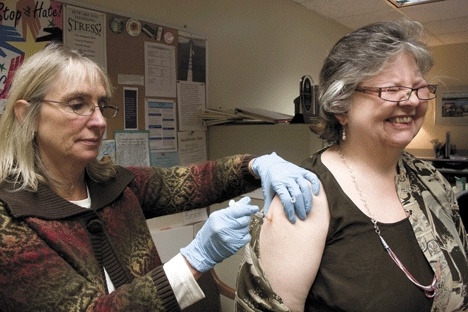Mark Borden, the emergency room director at Whidbey General Hospital, hopes the flu-infected will heed this warning: Stay away from the ER.
Too many sick people are unnecessarily flooding the Whidbey General ER in fear that they may have contracted the H1N1 swine flu, he said.
Cold weather doesn’t cause people to get sick. Crowded, poorly ventilated spaces, however, create a ripe environment for airborne viral infections. With that in mind, he said, sick people should avoid the ER unless they are in need of immediate care.
“The reaction of people to the cold and the bringing of people together causes the spread of the flu virus,” Borden said.
People with flu-like symptoms should stay home and rest, drink plenty of fluids and take ibuprofen or Tylenol to help with fever and body aches, he said. They should not go to the ER unless they experience shortness of breath.
“Shortness of breath does not mean a stuffy nose,” he said. “You can always breathe out of your mouth.”
Borden described shortness of breath as when a patient takes more breaths than normal, but still feels like they’re not getting enough air.
Whidbey General Hospital is following the Center for Disease Control’s recommendations in dealing with the swine flu. The hospital is no longer testing for swine flu.
“It’s very unlikely that we’ll test anyone,” Borden said.
The test itself isn’t very accurate, he explained, equating it to a coin flip. “At best, it’s 50-percent sensitive. It has a 10 to 70-percent accuracy. It’s almost useless.”
Borden estimates that 99 percent of the flu patients who’ve come to Whidbey General have H1N1, but that’s not a cause for concern.
“There’s only enough room for one tough kid on the block,” he said. This year, the tough guy is H1N1.
It’s a little different than most flu strains because it’s attacking a different age range, but it no more dangerous than the regular seasonal flu, he said.
“People don’t need to be particularly worried,” he said. “The southern hemisphere already dealt with the flu season and were fine with it,” he said, adding that the only concern would be if H1N1 mutates into something worse.
There’s been an increase in the number of visitors to the emergency room, Borden said, but he hasn’t noticed any increase in the severity of those patient’s symptoms.
For the unfortunate bunch who catch this year’s bug, Tamiflu can shorten the length of recovery by two days if taken at the first sign of symptoms, he said. The average flu lasts for 14 days.
“Overall, it’s not very effective,” he said. And it’s “fairly expensive.”
In case of a Tamiflu shortage, Island Drug has been designated the official site for a government-supported backup supply, he said.
Antibiotics should not be taken for the flu, Borden said. In some cases, antibiotics may make symptoms worse in flu patients.
“This whole thing has been overblown,” he said.
However, the hospital isn’t taking any chances.
Hospital CEO Tom Tomasino canceled the annual hospital-hosted Halloween party for staff and employees’ children this year, said Trish Rose, hospital spokeswoman.
“We hate to do it, but it’s the right thing to do,” she said.
Whidbey General has also decided to limit the visitation of children under the age of 12, and to screen patients and visitors as they enter the hospital. The policy went into effect Tuesday, Oct. 27.



